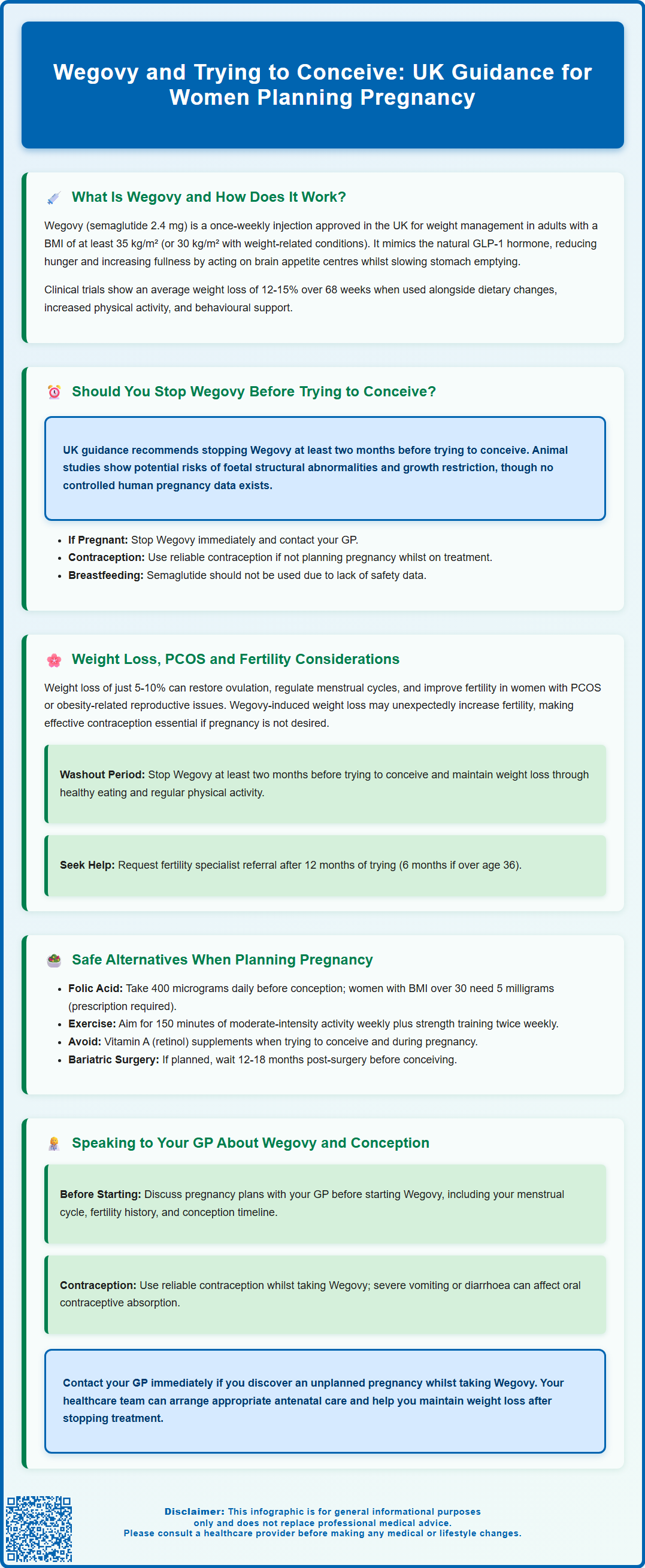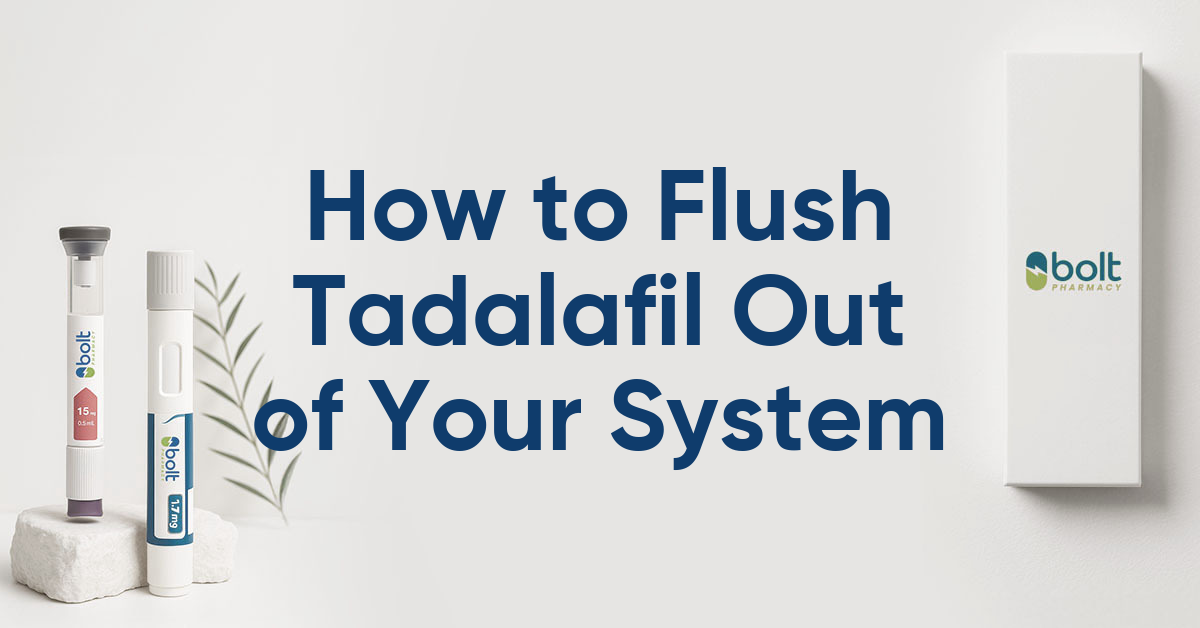Wegovy (semaglutide 2.4 mg) is a prescription weight-loss medication increasingly used in the UK for managing obesity and related health conditions. For women planning to start a family, understanding how Wegovy interacts with fertility and pregnancy is crucial. Current UK guidance recommends stopping Wegovy at least two months before attempting to conceive due to limited safety data during pregnancy and the medication's effects on foetal development in animal studies. This article explores the relationship between Wegovy and trying to conceive, including when to discontinue treatment, how weight loss affects fertility, and safe alternatives when planning pregnancy.
Summary: Women taking Wegovy should stop the medication at least two months before trying to conceive, as recommended by UK regulatory guidance due to limited pregnancy safety data.
- Wegovy is a GLP-1 receptor agonist that reduces appetite and slows gastric emptying to support weight management in adults with obesity.
- The MHRA and manufacturer advise discontinuing semaglutide at least two months before planned pregnancy due to its one-week half-life and insufficient human safety data.
- Weight loss can significantly improve fertility in women with PCOS or obesity-related reproductive dysfunction by restoring ovulation and regulating menstrual cycles.
- Lifestyle modifications including balanced nutrition, folic acid supplementation and regular physical activity are safe alternatives when planning pregnancy.
- Women should use reliable contraception whilst taking Wegovy and discuss family planning intentions with their GP before starting treatment.
Table of Contents
What Is Wegovy and How Does It Work?
Wegovy is the brand name for semaglutide 2.4 mg, a prescription medicine licensed in the UK for weight management in adults with obesity or those who are overweight with weight-related health conditions. According to NICE Technology Appraisal 875, Wegovy is recommended only within specialist weight management services for people with a BMI of at least 35 kg/m² (or 30 kg/m² with weight-related comorbidities), with lower thresholds for some ethnic groups, and is typically prescribed for up to 2 years.
Wegovy belongs to a class of medications called glucagon-like peptide-1 (GLP-1) receptor agonists, which were originally developed for treating type 2 diabetes but have proven effective for weight reduction. The medication works by mimicking a naturally occurring hormone called GLP-1, which is released in the gut after eating. Semaglutide activates GLP-1 receptors in several areas of the body, including the brain, pancreas and digestive system. In the brain, it acts on appetite centres to reduce hunger and increase feelings of fullness, making it easier to consume fewer calories. It also slows gastric emptying, meaning food remains in the stomach longer, which contributes to prolonged satiety after meals.
Wegovy is administered as a once-weekly subcutaneous injection, typically into the abdomen, thigh or upper arm. As outlined in the Summary of Product Characteristics (SmPC), the dose is gradually increased over several months to minimise gastrointestinal side effects such as nausea and vomiting. Treatment should be provided alongside dietary modification, increased physical activity and behavioural support.
Clinical trials (STEP 1 programme) have demonstrated that Wegovy can lead to significant weight loss, with participants losing an average of 12 to 15 per cent of their body weight over 68 weeks. This substantial reduction can improve various obesity-related conditions including hypertension, dyslipidaemia and obstructive sleep apnoea. However, the medication's effects on reproductive health and pregnancy outcomes require careful consideration, particularly for women planning to conceive.
Should You Stop Wegovy Before Trying to Conceive?
Current UK guidance strongly recommends discontinuing Wegovy before attempting to conceive. The Medicines and Healthcare products Regulatory Agency (MHRA) and the manufacturer's Summary of Product Characteristics advise that women should stop taking semaglutide at least two months before a planned pregnancy. This recommendation is based on the medication's long half-life of approximately one week, meaning it takes several weeks for the drug to be completely eliminated from the body.
The primary concern relates to limited safety data regarding semaglutide use during pregnancy. Animal reproduction studies have shown adverse effects on foetal development, including structural abnormalities and growth restriction, when GLP-1 receptor agonists were administered during pregnancy. Whilst animal studies do not always predict human outcomes, the precautionary principle applies when insufficient human data exists. There is currently no robust evidence from controlled studies in pregnant women to establish the safety profile of Wegovy during conception or early pregnancy.
Additionally, the significant weight loss and metabolic changes induced by Wegovy may not be appropriate during pregnancy. Pregnancy requires adequate nutritional intake to support foetal growth and development, and the appetite suppression caused by semaglutide could potentially compromise maternal nutrition at a critical time. The medication may also cause gastrointestinal symptoms such as nausea and vomiting, which could be confused with or exacerbate pregnancy-related morning sickness.
If you discover you are pregnant whilst taking Wegovy, you should stop the medication immediately and contact your GP or specialist for advice. The UK Teratology Information Service (UKTIS) can provide healthcare professionals with case-specific risk assessments following inadvertent exposure. It is worth noting that unplanned pregnancies can occur, so reliable contraception should be used whilst taking Wegovy if you do not wish to conceive. Women should discuss their family planning intentions with their prescriber before starting treatment to ensure the timing aligns with their reproductive goals.
It is also important to note that semaglutide should not be used during breastfeeding, as stated in the SmPC, due to insufficient data on its excretion in human milk and potential effects on the infant.

Weight Loss, PCOS and Fertility Considerations
Excess body weight, particularly central adiposity, contributes to insulin resistance and hyperinsulinaemia, which in turn stimulate excessive androgen production by the ovaries. Elevated androgens disrupt normal ovarian follicle development and ovulation. Additionally, obesity is associated with chronic low-grade inflammation and altered levels of adipokines, hormones produced by fat tissue that influence reproductive function. Even modest weight reduction of 5 to 10 per cent of body weight can restore ovulation, regulate menstrual cycles and improve fertility outcomes in women with PCOS, as supported by NHS and RCOG guidance.
For women who have achieved significant weight loss with Wegovy, fertility may improve substantially, sometimes unexpectedly. This means that women who previously experienced difficulty conceiving due to obesity or PCOS may find themselves more fertile after weight reduction. It is therefore essential to use effective contraception whilst taking Wegovy if pregnancy is not desired, and to plan the discontinuation of the medication appropriately when conception is intended.
The optimal approach involves achieving weight loss goals with Wegovy, then stopping the medication for at least two months before actively trying to conceive. During this washout period, efforts should focus on maintaining weight loss through continued lifestyle modifications including balanced nutrition and regular physical activity. Some women may benefit from referral to a fertility specialist, particularly if PCOS or other reproductive conditions are present, to optimise their chances of conception once Wegovy has been discontinued. According to NICE Clinical Guideline 156, referral for fertility assessment should be considered after 12 months of trying to conceive (or 6 months for women aged 36 or over), or earlier if there are known factors such as anovulation or amenorrhoea. Your GP can coordinate this multidisciplinary approach to support both your weight management and fertility goals.
Safe Alternatives When Planning Pregnancy
When planning pregnancy, the focus shifts from pharmacological weight management to lifestyle-based approaches that are safe for conception and early pregnancy. The cornerstone of maintaining weight loss and supporting fertility involves sustainable dietary modifications, regular physical activity and behavioural strategies that can be continued throughout pregnancy.
A balanced, nutrient-dense diet is essential when preparing for pregnancy. The NHS recommends consuming a variety of foods including fruits, vegetables, whole grains, lean proteins and healthy fats whilst limiting processed foods, added sugars and saturated fats. Adequate intake of key nutrients is particularly important: folic acid supplementation of 400 micrograms daily should begin before conception to reduce the risk of neural tube defects, and vitamin D supplementation of 10 micrograms daily supports bone health and immune function. The NHS and Royal College of Obstetricians and Gynaecologists advise that women with a BMI over 30 may require higher doses of folic acid, typically 5 milligrams daily (available on prescription), to achieve adequate levels. Vitamin A (retinol) supplements should be avoided when trying to conceive and during pregnancy, as excessive amounts can harm the developing baby.
Physical activity remains safe and beneficial when trying to conceive and during pregnancy. The UK Chief Medical Officers' guidelines recommend at least 150 minutes of moderate-intensity aerobic activity weekly, which can include brisk walking, swimming or cycling. Strength training exercises twice weekly help maintain muscle mass and metabolic health. Exercise supports weight maintenance, improves insulin sensitivity and may enhance fertility, particularly in women with PCOS.
For women who require additional support, referral to a specialist weight management service or dietitian can provide structured guidance. Some areas offer tier 3 weight management services through the NHS, which provide intensive lifestyle interventions without medication. Psychological support may also be valuable, as behavioural strategies help address emotional eating, stress management and long-term habit change. Cognitive behavioural therapy approaches have demonstrated effectiveness in supporting sustained weight management.
It is important to note that other weight loss medications, including orlistat and other GLP-1 receptor agonists, are also not recommended during preconception or pregnancy according to their respective SmPCs. Bariatric surgery, if being considered, should ideally be completed well in advance of pregnancy, with conception typically delayed for 12 to 18 months post-operatively to allow for weight stabilisation and nutritional optimisation, as advised by NHS guidance.
Speaking to Your GP About Wegovy and Conception
Open communication with your GP or prescribing specialist is essential when considering pregnancy whilst taking Wegovy. This conversation should ideally occur before starting the medication if you are planning to conceive within the foreseeable future, or as soon as you begin considering pregnancy if you are already taking Wegovy. Your healthcare team can help you develop a personalised plan that balances your weight management goals with your reproductive intentions.
During your consultation, be prepared to discuss your menstrual cycle regularity, any history of fertility difficulties, underlying conditions such as PCOS or diabetes, and your timeline for conception. Your GP will review your current weight, BMI and any obesity-related health conditions to assess how much weight loss might be beneficial before conception. They can help you set realistic goals and determine an appropriate duration of Wegovy treatment before discontinuation. For some women, achieving significant weight loss before pregnancy may improve both fertility and pregnancy outcomes, potentially justifying a longer treatment period followed by the recommended two-month washout.
Your GP should also review your contraception to ensure you have reliable pregnancy prevention whilst taking Wegovy. According to the SmPC, semaglutide does not have clinically relevant interactions with combined oral contraceptives. However, if you experience severe vomiting or diarrhoea while taking Wegovy, this could potentially affect oral contraceptive absorption, and you should follow the Faculty of Sexual and Reproductive Healthcare (FSRH) 'missed pill' guidance. Once you decide to stop Wegovy in preparation for conception, your healthcare team can arrange follow-up appointments to monitor weight maintenance and provide ongoing lifestyle support.
If you have been taking Wegovy and discover an unplanned pregnancy, contact your GP promptly. Human data on semaglutide exposure during pregnancy are limited, so your doctor will want to arrange appropriate antenatal care and monitoring. They may refer you to obstetric services and the UK Teratology Information Service (UKTIS) for additional assessment and advice. Remember that stopping the medication immediately upon discovering pregnancy is the recommended course of action, and your healthcare team is there to support you through this transition without judgement, ensuring the best possible outcomes for both you and your baby.
Scientific References
- Wegovy 0.25 mg, FlexTouch solution for injection in pre-filled pen - Summary of Product Characteristics.
- Semaglutide for managing overweight and obesity. Technology Appraisal 875.
- Fertility problems: assessment and treatment. Clinical Guideline 156.
- Polycystic ovary syndrome - Treatment.
- Use of GLP-1 receptor agonists in pregnancy.
- Once-Weekly Semaglutide in Adults with Overweight or Obesity.
Frequently Asked Questions
How long should I stop taking Wegovy before trying to get pregnant?
You should stop taking Wegovy at least two months before attempting to conceive, as recommended by the MHRA and manufacturer. This allows sufficient time for the medication to be eliminated from your body given its approximately one-week half-life.
Can weight loss from Wegovy improve my chances of getting pregnant?
Yes, weight loss achieved with Wegovy can significantly improve fertility, particularly for women with PCOS or obesity-related reproductive issues. Even modest weight reduction can restore ovulation and regulate menstrual cycles, though the medication must be stopped before actively trying to conceive.
What should I do if I become pregnant while taking Wegovy?
If you discover you are pregnant whilst taking Wegovy, stop the medication immediately and contact your GP or specialist for advice. Your doctor will arrange appropriate antenatal care and may refer you for specialist assessment regarding the inadvertent exposure.
The health-related content published on this site is based on credible scientific sources and is periodically reviewed to ensure accuracy and relevance. Although we aim to reflect the most current medical knowledge, the material is meant for general education and awareness only.
The information on this site is not a substitute for professional medical advice. For any health concerns, please speak with a qualified medical professional. By using this information, you acknowledge responsibility for any decisions made and understand we are not liable for any consequences that may result.
Heading 1
Heading 2
Heading 3
Heading 4
Heading 5
Heading 6
Lorem ipsum dolor sit amet, consectetur adipiscing elit, sed do eiusmod tempor incididunt ut labore et dolore magna aliqua. Ut enim ad minim veniam, quis nostrud exercitation ullamco laboris nisi ut aliquip ex ea commodo consequat. Duis aute irure dolor in reprehenderit in voluptate velit esse cillum dolore eu fugiat nulla pariatur.
Block quote
Ordered list
- Item 1
- Item 2
- Item 3
Unordered list
- Item A
- Item B
- Item C
Bold text
Emphasis
Superscript
Subscript












